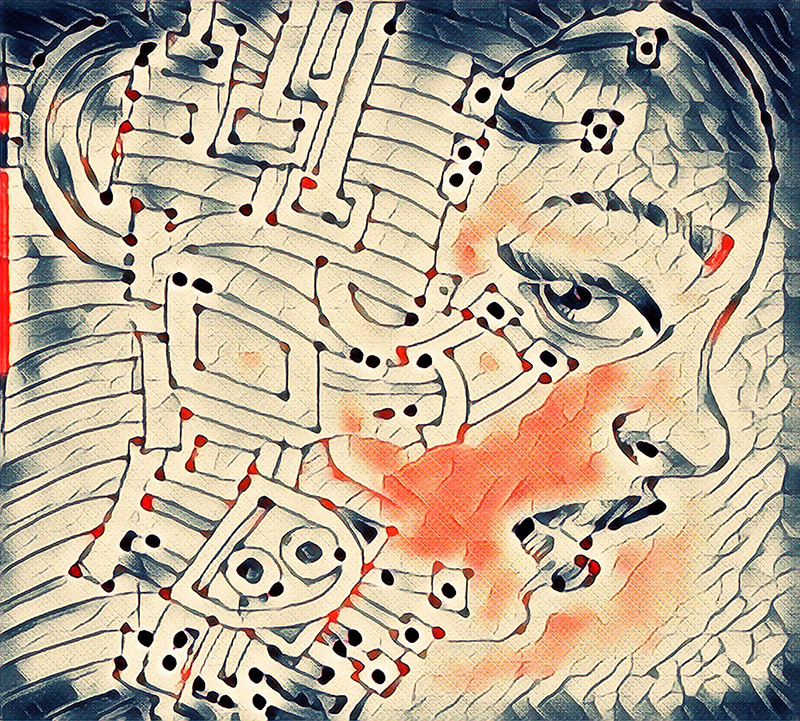
Editorial

It always seems there is never enough time in life to read all the things I want to – maybe you’re familiar with the feeling. Despite this, and despite the fact that there are many shiny new books being published all the time that I would really like to dive into, I seem to keep picking up old science fiction books and reading them first.
Sometimes this can be a true pleasure, sometimes more a disastrous mistake. But even in the latter cases there can be elements of the rewarding mixed in with the cringe. And second-hand bookshops are among my favourite places to be.
Let me present examples to cover both bases, which also happen to have coincidental titles and share a bit of a theme and, well, not a lot else. A few years ago I read what immediately became a favourite: Marge Piercy’s 1976 novel Woman on the Edge of Time, a “critical utopia” that shines a painfully sharp light on the racial inequality and mental health treatment of its era, and therefore on the culture permitting both. Alongside her institutionalised struggles in Piercy’s contemporary New York, the protagonist becomes psychically linked with a visitor from a distant future in which the world has (mostly) abandoned its capital- and resource-hungry ways in favour of rural egalitarianism achieved through a somewhat precarious degree of post-scarcity. Her belief that she is able to travel through time to experience these wonders unsurprisingly causes more than a few problems as regards her ongoing diagnosis.
Woman on the Edge of Time is really good. Despite being partly set in the period of its writing, now almost half a century in the past, and partly in a distant future imagined under the influences of that same time, a reader today doesn’t encounter any sense of datedness; the glimpses of our past in the mental facility feel vibrant and authentic and timeless in the way that good writing always does, and (as is sadly often the case) the social critique at work still has teeth.
It would be nice to say that John Brunner’s 1971 novel The Wrong End of Time enjoyed all those same qualities. It doesn’t.
The novel begins with a Russian spy arriving off the North American coastline bearing a vital message for his nation’s best sleeper agent, an executive who’s been embedded at the top of one of the USA’s economically and politically vital corporations for so long that he’s effectively gone native. The only reason he’s able to set foot on American soil without triggering a global nuclear exchange is that a young black man with highly unfocused psychic abilities felt the urge to wander down to the local control nexus of the world’s most deadly powerful defence system and turn it off several hours before – a decision which goes on to have further coincidental and complicating effects on the lives of all concerned.
That vital message is a complete McGuffin, by the way – aliens! – and is barely mentioned outside the first and last few pages of the book. What we get instead are a variety of perspectives showcasing the author’s critique of American culture, which mostly range from exaggerated for effect to the painfully, horribly dated. Brunner had chops as a writer, he won the Hugo for Best Novel just a few years previously for Stand on Zanzibar. But here, while we perhaps surprisingly have an African-American main character with considerable depth, we also find a trio of dead-eyed gang-members whose speech is rendered in an all but unreadable phonetic street patois, embarrassing in a way that nowadays would be branded as ridiculously clumsy at best, and please-no-grandpa racist at worse.
In these books I’ve no doubt that both Piercy and Brunner put pen to paper with nought but good intentions, but time can be not so much cruel as justifiably unsympathetic. One made me shake my head in admiration, the other in admonition, but still I find I don’t regret reading The Wrong End of Time once when I could have read Woman on the Edge of Time twice instead. Nor one of those shiny new releases, for that matter, which today will certainly be free of ridiculous sho’nuff yoo muvva dialogue but might well expose poor writing of other sorts.
Still, despite its multiple faults (and few today could read The Wrong End of Time without wincing so hard their hair would part up the back of the head) there are still elements at play that are of general interest. The social divides within American culture; the dominance of its corporate world and subservience of its political; its militarism, internal and external; all facets that troubled Brunner as an outside observer more than fifty years ago are still troubling to an outside observer like me, and not all his explorations are as disastrously flawed. There are also more than just hints regarding man-made climate change or ecological crisis, a theme that crops up in much spec-fic of the 70s and which of course feels fiercely relevant today, even if in other regards this book does not.
Treatment is everything, and writing’s a tough game, but the past has no monopoly on the bad and it certainly has no shortage of the good. So the next time you finish one book and reach for another, consider looking backwards before you look forwards.